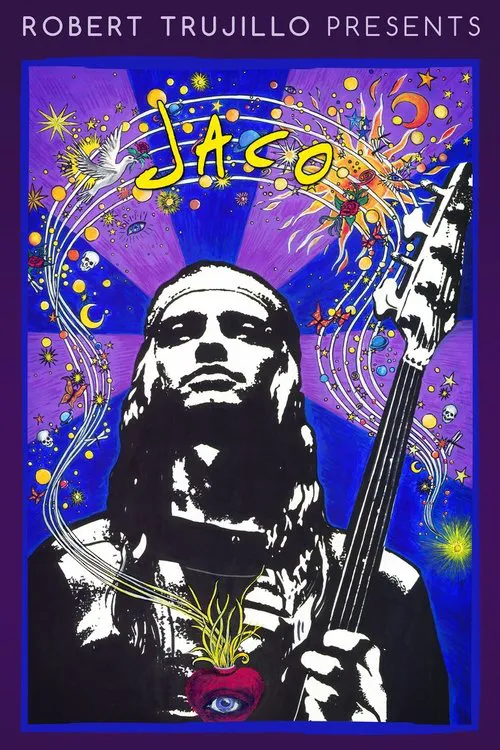Jaco

Plot
Jaco Pastorius, a name synonymous with the art of bass playing, was a larger-than-life figure whose influence on modern music cannot be overstated. Born on December 1, 1951, in Norristown, Pennsylvania, Jaco quickly established himself as a self-taught prodigy, effortlessly soaring to the pinnacle of greatness through sheer force of will and dedication. His remarkable story is one of passion, creativity, and heartbreak, as he left an indelible mark on the world of music before his untimely demise. As a young boy, Jaco showed an intense fascination with the electric bass guitar, which he began playing at the tender age of 14. Without formal lessons or guidance, he immersed himself in the world of music, devouring recordings by Miles Davis, Wayne Shorter, and John McLaughlin, among others. His unique approach to the bass – characterized by lightning-fast runs, melodic sophistication, and an unwavering commitment to rhythm – set him apart from his contemporaries, and he quickly gained recognition as a virtuoso in his own right. Jaco's professional career as a bassist began in earnest with his tenure in the jazz-funk group Weather Report, alongside saxophonist Wayne Shorter, keyboardist Joe Zawinul, and drummer Alphonso Johnson. During his time with this legendary ensemble, Jaco not only proved himself to be an indispensable asset but also forged a deep bond with Shorter, who would later describe Jaco as the greatest bassist he had ever played with. The group's innovative approach to jazz and funk music, which often featured extended instrumental passages and intricate time signatures, provided Jaco with the perfect platform to showcase his remarkable skills. In 1979, Jaco departed Weather Report to forge a more solo-oriented career, releasing his groundbreaking debut album, "Jaco Pastorius," which would become a pivotal moment in his already illustrious career. This self-titled effort cemented his status as a bass hero, with compositions such as "Opus Pocus" and "Come On, Come Over," featuring intricate bass lines, lyrical phrasing, and a captivating, expressive intensity that redefined the role of the electric bass in jazz and rock music. Throughout the 1980s, Jaco collaborated with an array of musicians from diverse genres, including Joni Mitchell, Pat Metheny, and Peter Gabriel. He became a sought-after sideman, his remarkable bass playing a coveted element in many top-notch ensembles. Nevertheless, Jaco faced numerous challenges during this period, including a tumultuous relationship with his wife, Deborah, and his escalating struggles with addiction and depression. Despite these personal demons, he continued to produce innovative, boundary-pushing music that captivated audiences worldwide. One of Jaco's most enduring compositions, "The Chicken," has become an anthem of sorts among bassists and music enthusiasts alike, with its infectious, hypnotic groove and dazzling melodic interplay between bass and fretboard. This song, featuring Jaco's unforgettable, sinuous lines and unbridled passion, perfectly encapsulates the essence of his artistic vision: a unique fusion of melodic depth, technical virtuosity, and rhythmic complexity. Jaco's later years saw him struggle with both physical and mental health issues, compounded by the pressures of fame and personal relationships. Despite numerous offers to record and perform, his creative output slowed, and he became increasingly withdrawn from the music scene. Tragically, his life was cut short on September 12, 1987, when he was brutally beaten by two men outside a Miami nightclub, an incident that would eventually prove fatal. Never-before-seen 8mm film, photographs, and audio recordings unveiled in the film "Jaco" provide a poignant glimpse into the private life and creative struggles of a genius whose impact on modern music can never be measured. This intimate, deeply personal portrait humanizes a larger-than-life figure, revealing a complex, troubled individual whose passion for music was an ongoing, all-consuming force that both fueled and doomed his remarkable life. As the film masterfully interweaves personal anecdotes with historical context, we gain a deeper understanding of the events that shaped Jaco's life and the profound influence he left on generations of musicians that followed in his footsteps.
Ulasan
Rekomendasi



